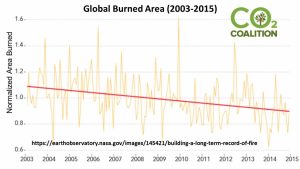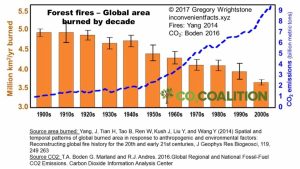More Good News About the Decline in Fires
By Gregory Wrightstone
In our last newsletter, we provided a chart revealing that the number of fires in Canada had been in a decades-long decline. This reflects a global trend in decreasing fire.
Beginning in 1998, advanced satellite detection of fires was initiated. The data shown in the chart to the right confirm that the area burned is in global decline. NASA reports that between 2003 and 2019, the area burned has dropped by roughly 25 percent. In addition, the Copernicus Atmosphere Monitoring Service reports that, according to their satellite data, the year 2020 was one of the least active years since records began in 2003.

At this point, you are likely asking yourself: Why are fires in decline? The surprising answer is that it is likely the result of the combination of modest warming and increasing CO2!
A study by scientists with the Canadian Forest Service compared temperatures and CO2 concentration versus frequency of forest fires over the last 150 years in North America and northern Europe. The authors demonstrated a link between more CO2 in the air and fewer fires worldwide. They attributed the decline in forest fires to the combined effect of CO2 fertilization and rising temperature, leading to greater soil moisture. Higher levels of atmospheric CO2 means that plants lose less water via the process of transpiration, which results in less moisture being drawn from soil. The Canadian scientists’ summary is worth reading:
Despite increasing temperatures since the end of the Little Ice Age (ca. 1850), wildfire frequency has decreased as shown by many field studies from North America and Europe. We believe that global warming since 1850 may have triggered decreases in fire frequency.

Gregory Wrightstone is a geologist; executive director of the CO2 Coalition, Arlington, VA; and author of Inconvenient Facts: The Science That Al Gore Doesn’t Want You to Know.
